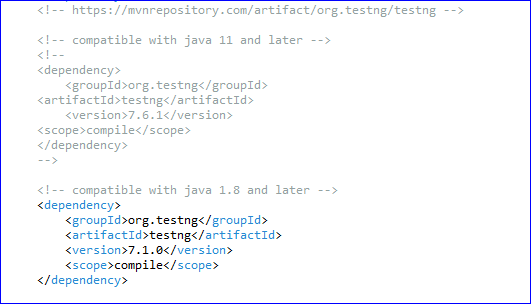Troubleshooting the "IResultListener has been compiled by a more recent version of the Java Runtime" Error

TestNG is a testing framework designed to make testing more powerful and easier to maintain. It offers a wide range of features such as annotations, assertions, test dependency management, and parallel test execution. This makes it an excellent choice for creating complex and comprehensive test suites for web applications.
When working with TestNg, encountering runtime errors is not uncommon. One such error that can cause frustration is the "IResultListener has been compiled by a more recent version of the Java Runtime" error. This error message usually indicates a compatibility issue between the Java Runtime version and the testng JAR version. In this article, we will explore the causes behind this error and provide effective solutions to resolve it.
Here is the TestNg error stack:
Please refer to C:\autospace1\web.drive.demo\target\surefire-reports for the individual test results.
Please refer to dump files (if any exist) [date].dump, [date]-jvmRun[N].dump and [date].dumpstream.
There was an error in the forked process
org/testng/internal/IResultListener has been compiled by a more recent version of the Java Runtime (class file version 55.0), this version of the Java Runtime only recognizes class file versions up to 52.0
org.apache.maven.surefire.booter.SurefireBooterForkException: There was an error in the forked process
org/testng/internal/IResultListener has been compiled by a more recent version of the Java Runtime (class file version 55.0), this version of the Java Runtime only recognizes class file versions up to 52.0
at org.apache.maven.plugin.surefire.booterclient.ForkStarter.fork(ForkStarter.java:628)
at org.apache.maven.plugin.surefire.booterclient.ForkStarter.run(ForkStarter.java:285)
at org.apache.maven.plugin.surefire.booterclient.ForkStarter.run(ForkStarter.java:250)
at org.apache.maven.plugin.surefire.AbstractSurefireMojo.executeProvider(AbstractSurefireMojo.java:1203)
at org.apache.maven.plugin.surefire.AbstractSurefireMojo.executeAfterPreconditionsChecked(AbstractSurefireMojo.java:1055)
at org.apache.maven.plugin.surefire.AbstractSurefireMojo.execute(AbstractSurefireMojo.java:871)
at org.apache.maven.plugin.DefaultBuildPluginManager.executeMojo(DefaultBuildPluginManager.java:137)
at org.apache.maven.lifecycle.internal.MojoExecutor.doExecute2(MojoExecutor.java:370)
at org.apache.maven.lifecycle.internal.MojoExecutor.doExecute(MojoExecutor.java:351)
at org.apache.maven.lifecycle.internal.MojoExecutor.execute(MojoExecutor.java:215)
at org.apache.maven.lifecycle.internal.MojoExecutor.execute(MojoExecutor.java:171)
at org.apache.maven.lifecycle.internal.MojoExecutor.execute(MojoExecutor.java:163)
at org.apache.maven.lifecycle.internal.LifecycleModuleBuilder.buildProject(LifecycleModuleBuilder.java:117)
at org.apache.maven.lifecycle.internal.LifecycleModuleBuilder.buildProject(LifecycleModuleBuilder.java:81)
at org.apache.maven.lifecycle.internal.builder.singlethreaded.SingleThreadedBuilder.build(SingleThreadedBuilder.java:56)
at org.apache.maven.lifecycle.internal.LifecycleStarter.execute(LifecycleStarter.java:128)
at org.apache.maven.DefaultMaven.doExecute(DefaultMaven.java:298)
at org.apache.maven.DefaultMaven.doExecute(DefaultMaven.java:192)
at org.apache.maven.DefaultMaven.execute(DefaultMaven.java:105)
at org.apache.maven.cli.MavenCli.execute(MavenCli.java:960)
at org.apache.maven.cli.MavenCli.doMain(MavenCli.java:293)
at org.apache.maven.cli.MavenCli.main(MavenCli.java:196)
at sun.reflect.NativeMethodAccessorImpl.invoke0(Native Method)
at sun.reflect.NativeMethodAccessorImpl.invoke(NativeMethodAccessorImpl.java:62)
at sun.reflect.DelegatingMethodAccessorImpl.invoke(DelegatingMethodAccessorImpl.java:43)
at java.lang.reflect.Method.invoke(Method.java:498)
at org.codehaus.plexus.classworlds.launcher.Launcher.launchEnhanced(Launcher.java:282)
at org.codehaus.plexus.classworlds.launcher.Launcher.launch(Launcher.java:225)
at org.codehaus.plexus.classworlds.launcher.Launcher.mainWithExitCode(Launcher.java:406)
at org.codehaus.plexus.classworlds.launcher.Launcher.main(Launcher.java:347)
Causes of the Error:
#1. JDK/JRE and TestNg Version Mismatch:
The most common cause of this error is a discrepancy between the version of the JDK used to compile the test code and the version of the TestNag used for testing.
Outdated TestNg:
If your TestNg is outdated, it may not go well with the latest JDK or JRE. Example; testng version 7.1.0 is compatible only with JDK 1.8 and fails with JDK 11 or later.
If you try to use testng version 7.6.1 with JDK 1.8, we get "Java Runtime (class file version 55.0), this version of the Java Runtime only recognizes class file versions up to 52.0" error.
Testng version 7.1.0 is compatible with JDK 1.8
<dependency>
<groupId>org.testng</groupId>
<artifactId>testng</artifactId>
<version>7.1.0</version>
<scope>compile</scope>
</dependency>
Testng version 7.6.1 is compatible with JDK 11 or Later
<dependency>
<groupId>org.testng</groupId>
<artifactId>testng</artifactId>
<version>7.6.1</version>
<scope>compile</scope>
</dependency>
#2, Multiple Java Installations: Having multiple JDK or JRE installations on your system can create conflicts, causing the error to occur.
Solutions to Resolve the Error:
- Update Java Runtime Environment: Ensure that your JRE is up to date. Visit the official Java website and download the latest version of the JRE that corresponds to the JDK version used for compiling your code.
- Remove Multiple Java Installations: If you have multiple JDK or JRE installations, it's best to uninstall all versions and perform a clean installation of the required JDK and JRE.
- use correct testng version / maven dependency

Read Next :
- Selenium WebDriver API
- Selenium WebDriver Setup
- Selenium Maven Dependancy
- Selenium Locators
- Selenium with Maven
- Selenium Page Object Model (POM)
- Selenium TestNG
- Selenium Handling Alerts
- Selenium Handling Frames and Windows
- Selenium Waits
- Selenium Cross-browser Testing
- Selenium Reporting
- Selenium Stale Element Exception
- TestNg Class Version Error
- Selenium IDE Download & Installation on Chrome
- Selenium IDE Download & Installation on Microsoft Edge
- Selenium IDE Download & Installation on Mozilla Firefox
- Selenium vs Cypress vs Puppeteer
- Selenium Interview Questions
Selenium Tutorials
- Setting up selenium IDE - Download and install selenium IDE on windows
- Selenium vs Cypress vs Puppeteer
- Selenium Interview Questions
- Selenium WebDriver API
- Selenium WebDriver Setup
- Selenium Maven Dependancy
- Selenium Locators
- Selenium with Maven
- Selenium Page Object Model (POM)
- Selenium TestNG
- Selenium Handling Alerts
- Selenium Handling Frames and Windows
- Selenium Waits
- Selenium Cross-browser Testing
- Selenium Reporting
- Selenium Stale Element Exception
- TestNg Class Version Error
- Selenium IDE Download & Installation on Chrome
- Selenium IDE Download & Installation on Microsoft Edge
- Selenium IDE Download & Installation on Mozilla Firefox
- Selenium vs Cypress vs Puppeteer
- Selenium Interview Questions
Cypress Tutorials
Cypress Archives
- Cypress Installation Errors
- How to Install Cypress
- Cypress Uncaught Exception Handling
- Cypress Automation Examples
- Cypress Automation Tool Interview Questions
- Cypress File Upload Examples
- Error 509 Bandwidth Exceeded
- Cypress Commands
- Cypress Custom Commands
- Handling Cypress Tokens & LocalStorage
- Handling Cypress Multitabs
- Cypress Parallelization
- Cypress waits
- Cypress Still Waiting Error
- Cypress Test Run Errors
- Cypress vs Selenium vs Puppeteer
- Cypress vs Selenium
- Cypress vs Puppeteer